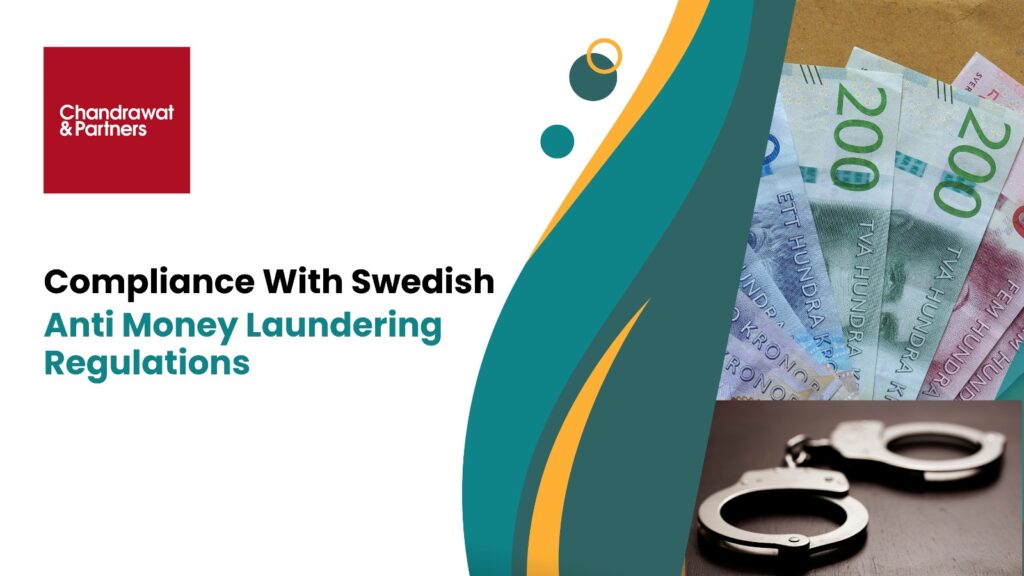
July 23, 2024
COMPLIANCE WITH SWEDISH ANTI MONEY LAUNDERING REGULATIONS
Money laundering is a significant threat to the global financial system enabling illicit activities such as terrorism, drug trafficking and corruption. In Sweden stringent Anti Money Laundering (“AML”) regulations are in place to combat these activities and ensure integrity of the financial sector.
UNDERSTANDING THE IMPORTANCE OF AML COMPLIANCE
Before diving into specific strategies, it is essential to understand why AML compliance is vital for financial institutions and businesses. The primary objectives of AML regulations are to:
- Protect the financial system: Ensuring that financial institutions are not used for illicit activities maintains the integrity and stability of the financial system.
- Enhance Reputation: Compliance with AML regulations enhances the reputation of financial institutions and businesses, fostering trust among clients and stakeholders.
- Avoid Penalties: Non-compliance with AML regulations can result in severe penalties, including fines and reputational damage.
KEY COMPONENTS OF ANTI MONEY LAUNDERING COMPLIANCE
Effective AML compliance involves several key components. Each of these components plays a critical role in detecting and preventing money laundering activities.
1. Risk Assessment
A thorough risk assessment is the foundation of any Anti Money Laundering compliance program. Financial institutions and businesses must identify and assess the money laundering risks they face based on factors such as customer profiles, products and services offered, and geographical locations of operation. This risk-based approach allows institutions to allocate resources effectively and implement appropriate controls.
2. Customer due diligence (“CDD”)
Customer due diligence (CDD) involves verifying the identity of customers and understanding the nature of their business relationships. Effective CDD procedures help identify high-risk customers and transactions, enabling institutions to apply enhanced due diligence (EDD) measures where necessary.
3. Transaction monitoring
Transaction monitoring involves the continuous review of customer transactions to identify and report suspicious activities. Advanced monitoring systems and technologies can help automate this process, making it more efficient and effective.
4.Training and awareness
Employee training and awareness are critical components of an effective AML compliance program. All employees, particularly those in customer-facing and compliance roles, should be well-informed about AML regulations, policies, and procedures.
5. Record keeping
Maintaining accurate and comprehensive records is essential for AML compliance. This includes records of customer identities, transactions, risk assessments, and any suspicious activity reports (SARs) filed.
TECHNOLOGICAL SOLUTIONS FOR AML COMPLIANCE
In the modern financial landscape, technological solutions play a vital role in enhancing AML compliance efforts. These solutions can streamline processes, improve accuracy, and reduce the burden on compliance teams.
1. Artificial Intelligence (AI) and Machine Learning
AI and machine learning technologies can significantly enhance transaction monitoring and risk assessment processes. These technologies can analyze vast amounts of data, identify patterns, and detect anomalies that may indicate money laundering activities.
2. Block chain and Distributed Ledger Technology (“DLT”)
Block chain and DLT offer transparency and immutability, making them valuable tools for AML compliance. These technologies can enhance the traceability of transactions and provide a secure, tamper-proof record of financial activities.
3. Advanced Analytics and Big Data
Advanced analytics and big data technologies enable institutions to analyze complex datasets and uncover hidden patterns that may indicate money laundering activities. These tools can enhance the effectiveness of risk assessments and transaction monitoring.
RECENT AML INITIATIVES IN SWEDEN
Sweden government pushing the European Union to implement its most recent Anti Money Laundering proposals, and is keen to advance introduction of single rulebook of AML and centralized anti money laundering authority. These both initiatives gained more consensus from Europe states but the new location of AMLA is yet to be decided.
Sweden will also implement the EU’s Markets in Crypto assets (MICA) regulation, a landmark new framework for managing the risks posed by unbacked crypto-assets and stablecoins. MICA will come into effect in 2024, and joins the Transfer of Funds Regulation (TFR) which extends AML reporting and record-keeping obligations to crypto currency service providers.
These initiatives underscore Sweden’s commitment to maintaining a robust AML framework in line with international standards.
HOW WE CAN HELP?
- Our team conducts thorough risk assessments to identify potential money laundering and terrorist financing risks associated with our operations. By evaluating customer profiles, transaction patterns, and geographical exposures, we develop and implement tailored mitigation measures to address identified risks effectively.
- We ensure rigorous customer due diligence by verifying the identities of our clients, understanding the nature of their business relationships, and continuously monitoring transactions for suspicious activity. Enhanced due diligence is applied for high-risk customers, ensuring compliance with regulatory requirements and minimizing exposure to illicit activities.
- Our team provides regular training to employees on AML regulations, ensuring they can recognize and report suspicious activities. We have established clear reporting procedures, enabling timely and accurate reporting to the Swedish Financial Intelligence Unit (FIU). By maintaining comprehensive records and fostering a culture of compliance, our team ensures the firm’s adherence to AML regulations.
For more information or queries, please email us at
[email protected]
Key Contact

Surendra Singh Chandrawat
Managing Partner

